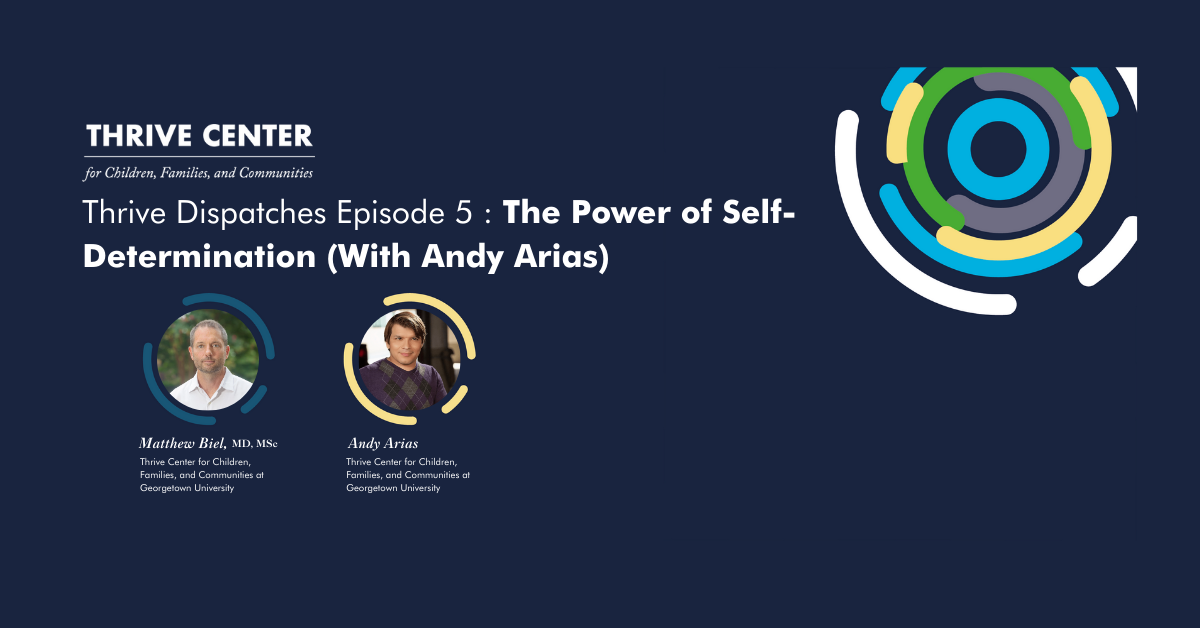Episode 5: The Power of Self-Determination (With Andy Arias)
This is Episode 5 of Thrive Dispatches, a podcast from Thrive Center for Children, Families, and Communities at Georgetown University.
In this episode, Dr. Matt Biel speaks with Andy Arias, whose work spans policy, advocacy, and program development in disability rights. Their conversation explores what it means to thrive at the intersection of disability, cultural identity, and lived experience. Andy brings perspective as a professional in disability policy, as a member of Latino and LGBTQ+ communities, and as someone who has lived with cerebral palsy since birth.
The discussion challenges conventional thinking about disability, presenting it not as a deficit or tragedy, but as a cultural identity that will touch all of our lives. Andy articulates a vision where self-determination becomes the foundation for authentic thriving.
For questions, comments, or ideas for future episodes, please email us at: thrivecenter@georgetown.edu
Summary:
In the following excerpt, Matt and Andy discuss how supporting young people and their families requires a shift in perspective—moving beyond medical models to embrace the full potential in every person.
Matt: For people who have not yet had experience with disability, because as we talked about, they will, we all will, what are people who have not yet had experience with disability in their lives most likely to misunderstand about the perspectives and goals of people who are living with disabilities?
Andy: I think that, and this happens to a lot of the people that get into the work, they do it ’cause they want to feel good about themselves, and that’s great. That should be a component, doing good, being good, feeling good. But if they were able to put themselves in the position of the individual that they are serving, which is something that I always try to do, whether or not this person is from a different ethnic group or community, ’cause the rainbow of disability is varied, and I include mental health in that too. Mental health is a disability, and I feel like that needs to be talked about even more.
But I feel that if people were to put themselves in that role or in that situation, they would gain a greater understanding of what disability is, not just for the people that they’re serving, but for how it will impact them. And really, you don’t have to reach far to find somebody in your life that is impacted by a disability. And I always tell people, if you don’t understand disability in a personal way and only in a work sort of way, get a disabled friend. Because as soon as you break down that barrier of this is just my work and this is just what I do from nine to five or nine to whatever, then you’ll understand the barriers that people with disabilities face on a day-to-day basis once it’s personal to you, and then you’ll start to get, “Shoot, this is going to happen to me someday. I better figure out this system for myself and this system for other people that I serve.”
Matt: People are showing up here to do this work ’cause they want to see impact, right?
Andy: Yeah.
Matt: And it could be very disheartening or discouraging to be pushing the boulder up the hill and having it roll back down again and again. And I imagine that’s particularly true for people in our center who have lived experience, who have lived with disabilities for their whole lives, or are caring for people in their families with disabilities that is particularly urgent and important. So as an individual who’s had a disability for your whole life, how does that experience influence the way that you think about policies that are developed and implemented for people who have disabilities?
Andy: Well, it’s very interesting ’cause I look at disability as a culture, and I think I’ve said this before in many circles at the Thrive Center, in many circles in every part of my job, I feel like disability’s going to impact everyone at one point or another. You’re going to age into it or you’re going to have an accident. It’s just going to happen to you.
So when I look at the policy that I develop, yes, I think about the infants and the childhood and the families, but I also look at it as like, I’m not just doing it for them, I’m doing it for everyone around the world, around the US, around the planet, because everyone will benefit from these systems, these policies, these practices someday. They might not now, it might be 20 years from now, but one day somebody’s going to pick up a piece of our programming and say like, “Wow, I never thought this could impact me, and now it does.” So that really pushes me forward to know that every single person that we come in contact with, disabled or not, will be impacted by our work.
- Tagged
- cerebral palsy
- cultural competence
- disability across lifespan
- disability as strength
- disability culture
- disability identity
- disability policy
- disability pride
- disability representation
- disability rights
- entertainment industry
- family support
- georgetown university
- inclusive policy
- intersectionality
- Latinx disability
- LGBTQ+ disability
- lived experience
- mental health
- policy advocacy
- self-determination
- systems change
- Thrive Center
- thriving with disability
